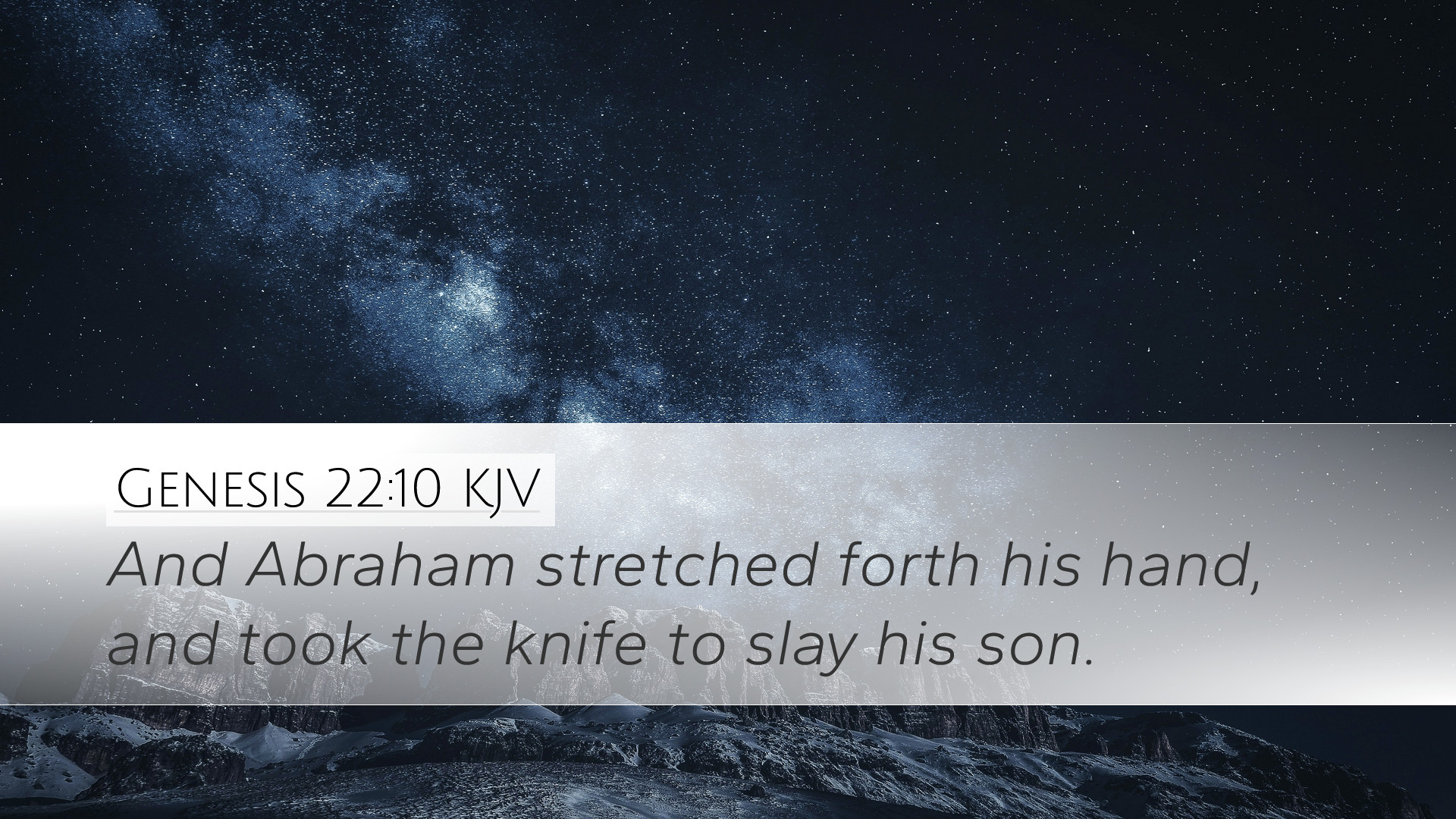Commentary on Genesis 22:10
Text of the Verse: "And Abraham stretched forth his hand, and took the knife to slay his son."
Introduction
This pivotal moment in the narrative of Abraham's life presents a profound test of faith. To fully understand the implications of this verse, it is essential to explore its theological, historical, and spiritual dimensions as elucidated by public domain commentators like Matthew Henry, Albert Barnes, and Adam Clarke.
The Context of the Passage
Genesis 22:10 is situated within the broader account of Abraham's near-sacrifice of his son Isaac. This event serves as a defining moment not only for Abraham but also for the foundational narrative of the Abrahamic covenant and the theme of faith and obedience.
- Historical Background: This trial occurs after God's covenant promises to Abraham and is steeped in the context of the ancient Near Eastern culture where sacrifice played a significant role.
- Theological Significance: The command to sacrifice Isaac directly challenges Abraham's understanding of God’s promises. It invokes questions of faith, obedience, and the nature of God's requirements.
Exegesis of Genesis 22:10
Abraham’s Obedience: The act of stretching forth the hand to take the knife illustrates the depth of Abraham's faith. Commentators assert that this was not an impulsive act but a deliberate step in obedience to God's command.
- Matthew Henry emphasizes Abraham's unwavering faith: “He did not hesitate to obey, reflecting profound trust in the Lord.”
- Albert Barnes notes that Abraham's willingness to sacrifice Isaac testifies to his profound relationship and trust in God, despite the emotional turmoil it caused.
- Adam Clarke points out that Abraham's action signifies a perfect trust in God's justice, arguing that God could raise Isaac from the dead if necessary.
The Knife as a Symbol
The knife, in this context, becomes a potent symbol of sacrifice and the ultimate test of faith. Abraham is portrayed as poised between obedience and the anguish of paternal love.
- Spiritual Implications: The knife symbolizes the cutting away of distractions and allegiances that might hinder complete devotion to God.
- The Nature of Sacrifice: It raises important questions concerning the costs of discipleship and what God may ask of His followers.
Faithful Trust Amid Trial
Abraham's readiness to slay his son illuminates the nature of faith under trial. Each commentator outlines the intersection of faith and fear:
- Matthew Henry notes, “Faith often operates in the face of dire contradictions, pressing forward in the assurance of God’s ultimate plan.”
- Albert Barnes highlights that true faith anticipates divine intervention even at the brink of despair, emphasizing the importance of trust in God’s providence.
- Adam Clarke remarks that Abraham exemplifies a faith that is not passive but active, characterized by immediate response to God’s commands.
The Role of Divine Intervention
In the narrative, God intervenes at the climax of this act, which brings forth significant theological reflections:
- Divine Providence: Abraham's actions foreshadow God's own sacrifice of His Son, providing a precursor to the themes of substitutionary atonement.
- God’s Provision: The ram caught in the thicket (not included in this verse but vital for context) signifies that God provides for His people, emphasizing His grace and mercy in the face of obedience and sacrifice.
Lessons for Believers
The story of Abraham's trial teaches valuable lessons relevant to believers today:
- Obedience Requires Risk: There are moments in a believer's life that require stepping into uncomfortable or even painful obedience, trusting in God's plan beyond immediate comprehension.
- Understanding God’s Nature: This passage challenges believers to consider the heart of God regarding sacrifice, love, and the ultimate purpose of faith.
- Hope Amid Trials: Just as Abraham had hope, believers today can rest in the assurance that God has a greater purpose even in their most challenging trials.
Conclusion
The verse Genesis 22:10 encapsulates the profound complexity of faith, obedience, and divine provision. The insights of venerable commentators like Matthew Henry, Albert Barnes, and Adam Clarke serve as a guide for understanding the implications of Abraham’s obedience and the character of God revealed through this narrative.
Ultimately, this passage invites readers—pastors, students, theologians, and scholars—to reflect on their own faith journeys and the depths of their trust in God when faced with trials. The story of Abraham calls for deep engagement with the character of God, prompting believers to ask, “How far are we willing to go in our faith?”


